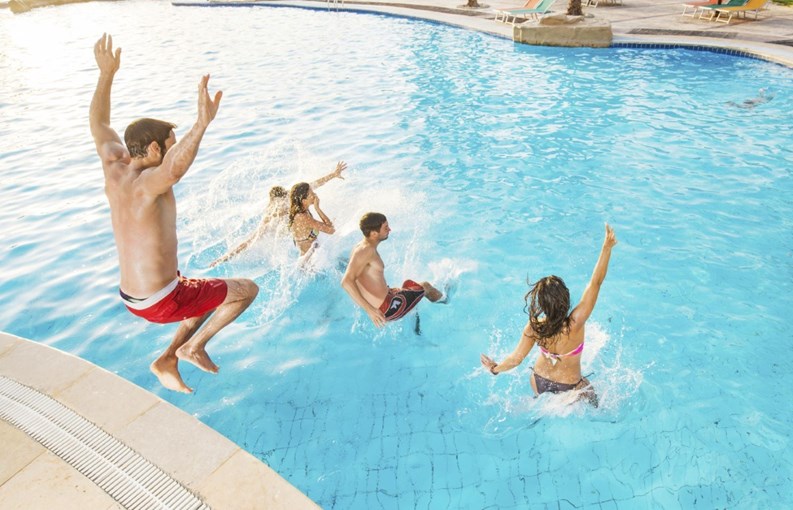Some lucky—and wealthy—co-ops and condos offer the benefits of an indoor or outdoor swimming pool for their residents; it’s a splashy amenity that many people request when looking for a home…but there are many kinks, issues, and liabilities that come with managing a pool.
Anyone who is considering living in a building with a pool, or thinking of running for board in a building with a pool, should learn about safety measures, diving boards, and other pools feature before diving in.
Pooling Concerns
Indeed, there are serious dangers involved with condo and co-op pools. From 2005 to 2007, there were 385 pool-related drownings for children younger than 15, and from 2007 to 2009, there were an average of 4,200 emergency department-treated submersions for children younger than the age of 15, according to the U.S. Consumer Product Safety Commission (CPSC).
Shockingly, 54 percent of the injuries from 2007 to 2009 and 74 percent of the fatalities between 2005 and 2007 (involving children younger than 15 happened) occurred at a residence. In Florida…the statistics are even more horrifying. In fact, the Sunshine State has unintentional drowning as the leading cause of death, annually, for children between ages 1 to 4, according to the Florida Department of Health.
A 2010 study published in the International Journal of Aquatic Research and Education found that drowning in residential swimming pools is a significant public health problem in Florida. There were approximately 1.1 million residential pools in Florida appraised in 2006, and there were 262 unintentional, confirmed pool drowning deaths from 2005–2007. For every 10,000 residential pools that a county has, 2.4 additional pool drowning deaths can be expected to occur over 3 years, the study found.
In Florida, more people drown than in any other state (except California), and Florida has the highest rate of children ages 1-4 drowning. These drowning cases are almost always preventable.
Last spring, in the Palm West Garden apartments, shoddy electrical work by the metal railings of the pool shocked a 5-year-old, a 6-year-old, and 10-year-old while they were swimming. The wires from the pool pump were hanging in the air instead of running into the ground, and they nearly killed all three children – despite the fact that the pool passed a 40-year inspection the previous year, as well as two health department inspections. Furthermore, 2 weeks before that, a 7-year-old boy from North Miami was electrocuted by the light in his pool; it wasn’t wired correctly.
A Need for Change
“Educating communities on the potential dangers of swimming pools is a critical tool in saving the lives of our children,” says Florida Congresswoman Debbie Wasserman Schultz, D-23, the author of the Virginia Graeme Baker Pool and Spa Safety Act.
The result of a tragic accident in June 2002, the Virginia Graeme Baker Pool and Spa Safety Act was introduced after suction from a Jacuzzi drain trapped the 7-year-old granddaughter of former Secretary of State James Baker III under water; it took two men to pull her from the drain, but it happened too late and she drowned.
Virginia’s mother, Nancy Baker, advocated for pool and spa safety and won support for a law requiring anti-entrapment drain covers and other safety devices. It was enacted by Congress and signed by President Bush in 2007, and became law in 2008. It prevents hidden hazards of drain entrapment in pools and spas. “I understand the need to bring together the public and dedicated partners in the water safety community to begin a national conversation about water safety,” Baker says.
Despite that law going into action, there was a similar pool drain accident in a Key Biscayne, Florida condo pool in 2009 after a 3-year-old girl’s arm was trapped in a skimmer drain. Fortunately, she survived the accident; though, if the pool had installed the new domed-shaped drains or large flat drains resulting from the VGB Pool and Spa Safety Act, then chances are, the girl wouldn’t have become stuck, officials said.
The Legal Effect
Pools at condo and apartment complexes are considered to be public in the context of the law; it should have been subject to the terms of the drain law. Water safety in Florida is a major issue. After all, most condos have pools.
Troy Avery, the president of USA Management, which has offices in Orlando and Fort Lauderdale, says his company, is constantly thinking of ways to make swimming safer in the pools they manage. Thus, they each have pool safety policies in place.
Children fewer than 48 inches tall get a wristband—indicating they are subject to height restrictions. Those kids have two options, Avery says. They can take a swim test, in which they must show swimming ability for the length of the pool, and tread water for 60 seconds, as well.
“That means that they are pretty water safe, and they can be in the pool without mom or dad by their side or without a life jacket,” Avery says. “If they don’t pass, we ask that parents be with them at all times, or be with a life jacket. We do this to try to help reduce the levels of drowning.”
Diving boards are by no means illegal in Florida; though, Avery claims few pools have them anymore because they are regulated by insurance companies as a possible safety hazard. In fact, that’s a key question in insurance questionnaires as diving boards drive up rates due to the number of spinal cord injuries that result from diving. “The rate of insurance goes much higher if they have a diving board or a deep end,” Avery says.
Florida law doesn’t require lifeguards, but Avery recommends that there be a safety zone for every 3,000 square feet. He also suggests that every pool has proper certified personnel on call who can respond quickly to issues.
Maintaining Overflowing Costs
Management companies can take care of everything, from the certified personnel person to safety policies, Avery says. “The management team would send someone out, or contract a chemical company, to keep the water chemistry in the proper ranges.”
While it sounds expensive to run a pool properly, there are ways to keep down the costs. Reduce costs by limiting the hours that the pool is open; have it open just during peak hours. That way, insurance will decrease because rates are determined by the number of hours the pool is in operation.
Failing at pool safety can cost a condo dearly. A Jacksonville jury ordered a condo association in Florida to pay $2.1 million to the parents of a 2-year-old who drowned at the complex because the fence around the outdoor pool had 6-inch gaps between its slats instead of the maximum 4-inch gaps. The boy wandered away from his parents through a crack left in the door by his father’s extension cord, and walked to the pool. By the time his parents realized he was gone, the boy had drowned.
In the case of Southern Owners Insurance Company v. Cooperative De Seguros Multiples, etc., the Florida’s Fifth District Court of Appeals decided that an owner within a condo association is not covered under the association’s insurance in a case claiming negligent supervision that ended in a child’s death through drowning.
The case occurred in 2014 after a 7-year-old boy in a private, gated condo was using the association’s shared swimming pool drowned. The boy’s mother filed a suit against the condo owner under the theory of negligent supervision, and she sued the association for negligence, also.
The trial court determined that the unit owner was covered under the association’s liability insurance but the appellate court reversed the lower court’s decision. They determined that there was no evidence that the homeowner owned the pool; as a homeowner, she was allowed access and use of the pool, but the policy coverage didn’t extend coverage for liability out of use. So a negligence action from the use wasn’t sufficient for the liability coverage.
Licensing in Florida
In order to operate a pool in Florida, a condo must have a public pool service technician who maintains the cleanliness, water quality, and chemical balance; the person should know how to clean, maintain, and disinfect the pool, and should know various chemicals that balance the pool. The person is required by Florida law to attend a class that’s at least 16 hours, and they must be certified by passing the test by 70 percent with a minimum of 50 questions.
The National Swimming Pool Foundation (NSPF) puts together a Certified Pool and Spa Operator course, a two-day class that teaches perspective pool operators to be certified, says Scott Ford, owner of Tropical Aquatics Pool Education, based in the Tampa Bay Area; the company teaches one of the courses.
“We bring pool safety as the paramount to anyone who touches a pool,” Ford says. “Death happens if this is done wrong, because we are dealing with different forms of chlorine, and a mixture of these would form a toxic gas. You have to have a thick respect for it…this is not just a swimming pool, anymore.”
Danielle Braff is a freelance writer and a frequent contributor to The Western & Central Florida Cooperator.





Leave a Comment